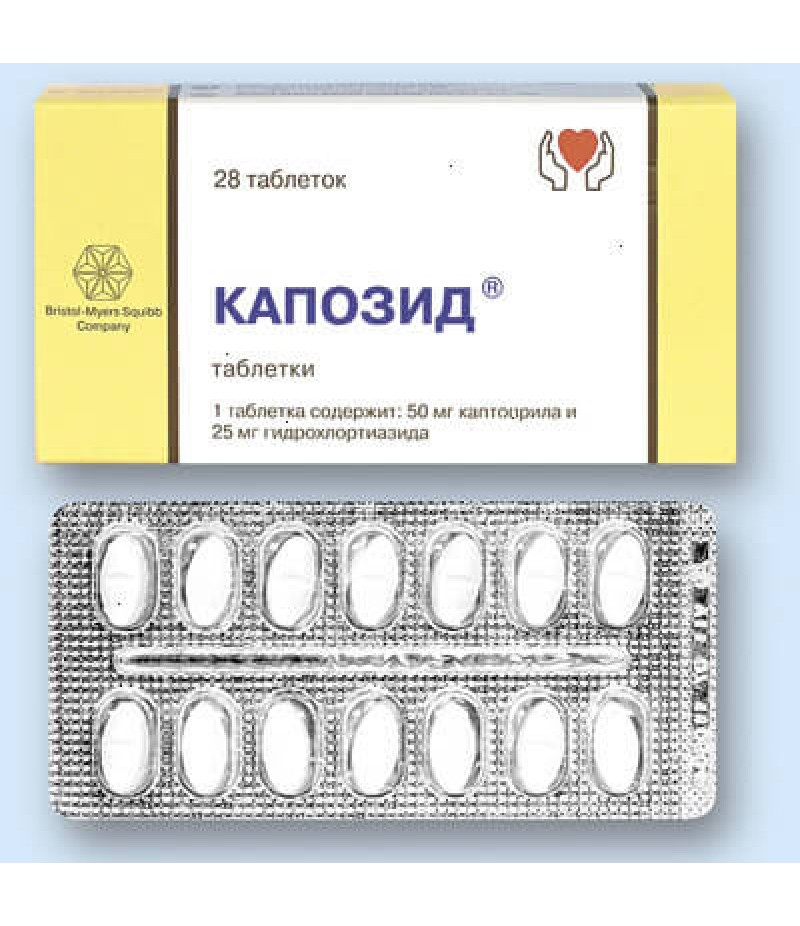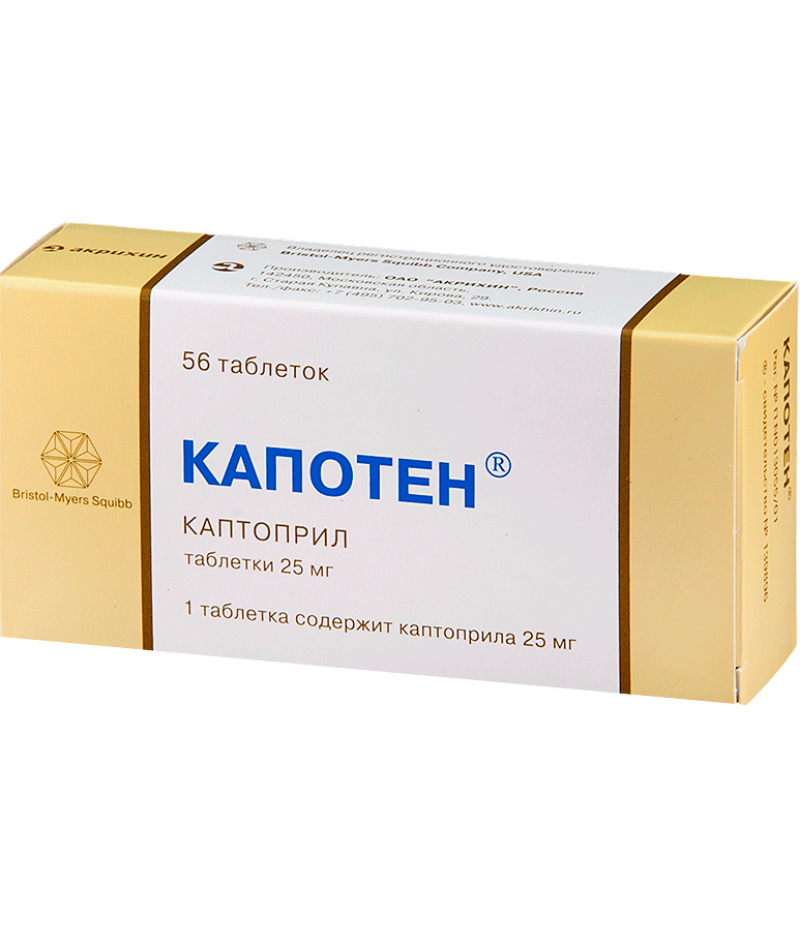Capozide tabs 50mg/25mg #28
- $15.77
- 3 or more $15.48
- Availability:In Stock
Capozide user manualReed more and buy Capozide on this pageCompositionOne tablet contains 50 milligrams of captopril and 25 milligrams of hydrochlorothiazide.Also contained magnesium stearate, lactose
Tags: tabs
Capozide user manual
Reed more and buy Capozide on this page
Composition
One tablet contains 50 milligrams of captopril and 25 milligrams of hydrochlorothiazide.
Also contained magnesium stearate, lactose, stearic acid, pregelatinized corn starch, microcrystalline cellulose.
Form of issue
Produced in the form of tablets that have a white or white with a cream-colored hue, oval shape, a notch on one side and squeezed out the inscription "SQUIBB" and the numbers "50/25" on the other side, bevelled edge and sulphide-like odor, biconvex. Sometimes there may be a slight marbling.
pharmachologic effect
Capozide is a diuretic and antihypertensive drug.
Hydrochlorothiazide, which is part of the drug, is a thiazide diuretic of medium strength and is able to reduce the reabsorption of sodium neon at the level of the cortical segment of the Henle loop. Lowers arterial pressure due to a change in the reactivity of the vessel wall, a decrease in the pressor effect of substances with a vasoconstrictor effect (norepinephrine and epinephrine), and an increase in the effect of depressor character on autonomic ganglia. Does not affect the acid-base state.
Captopril is an ACE inhibitor and reduces the release of aldosterone and the formation of angiotensin I and angiotensin II. Has an intensifying effect on renal and coronary blood flow, and also reduces blood pressure, preload, postload. The artery expands to a greater extent than the veins. Prolonged use reduces the aggregation of platelets, increases the blood supply of the ischemic myocardium, reduces the severity of hypertrophy of the walls of arteries and myocardium of the resistive type.
Pharmacodynamics and pharmacokinetics
Data is not available.
Indications for use of Capozid
Indication for the use of Capozid is arterial hypertension.
Contraindications
Capozide can not be taken with:
hypersensitivity to the contents of tablets, derivatives of sulfonamide, thiazide diuretics;
the age of 18 years;
pregnancy and lactation;
primary hyperaldosteronism;
expressed violations in the work of the kidneys;
severe hepatic disorders (hepatic coma, precomatous condition);
tachycardia;
arterial hypotension;
cardiogenic shock;
chronic heart failure;
condition after renal transplantation;
stenosis of the artery of a single kidney or bilateral stenosis of the renal arteries;
hypertrophic obstructive cardiomyopathy;
mitral stenosis;
stenosis of the aortic aorta;
angioneurotic edema (in anamnesis when taking ACE inhibitors).
It must be taken with caution when:
simultaneous appointment of lithium preparations, procainamide, allopurinol, immunosuppressants, cytostatics, GCS;
old age (over 65 years);
nodular periarteritis, scleroderma and SLE;
collagenoses, gout, hypercalcemia, hypovolemia, hyponatremia, hypokalemia, proteinuria;
moderate violations of the kidneys.
Side effects
The side effects are as follows:
Various: progression of myopia, impotence.
Metabolism: hyperuricemia, hyperglycemia, hyperlipidemia, hypermagnesia.
Urinary system: pollakiuria, glucosuria, oliguria, polyuria, proteinuria, in rare cases - hyponatremia, increased serum potassium ions, creatinine and urea, with prolonged use - nephritis and impaired renal function.
Hemostatic system: an increase in the titer of antinuclear antibodies, eosinophilia, neutropenia, leukopenia, thrombocytopenia, a decrease in hematocrit, anemia (including hemolytic and aplastic forms).
Central and peripheral nervous systems: paresthesia, tremor, visual impairment, tinnitus, dizziness, ataxia, convulsions, sleep disorders, depression, weakness, drowsiness, depression, fatigue and headache.
Digestive system: hyperbilirubinemia, increased activity of liver transaminases, cholestatic jaundice, hepatitis, hemorrhagic pancreatitis, acute cholecystitis, decreased appetite, abdominal pain, epigastric discomfort, diarrhea or constipation, nausea and vomiting, with prolonged use - a taste disorder and gingival hyperplasia .
Dermatology: epidermal necrolysis of toxic nature (Lyell's syndrome), Stevens-Johnson syndrome, exfoliative dermatitis, erythema multiforme, exanthema (rash on the skin). These skin changes may be accompanied by the development of vasculitis, pain in the joints and muscles and a rise in temperature. In rare cases, onycholysis, alopecia, photosensitization, psoriasis-like skin changes are possible.
Allergic reactions: angioedema, tongue and / or pharynx, larynx, mucous membranes, lips, face and limbs, in rare cases - hives.
Respiratory system: laryngitis, rhinitis, sinusitis, respiratory failure, dry cough, bronchospasm.
Water-electrolyte metabolism: thirst, dryness in the oral cavity, in rare cases - reducing the formation of tear fluid.
Cardiovascular system: severe arterial hypotension with symptoms of weakness and dizziness, edema of the shins, palpitation, tachycardia, headache, dizziness, a feeling of heat, "tides" of blood to the skin of the face.
Instructions for use of Capozide (Method and dosage)
In the instructions for the use of Capozide, it is indicated that the pill should be taken orally once a day, one hour before meals.
Overdose
Overdose may increase side effects. Treatment consists in symptomatic therapy.
Interaction
Methenamine sometimes reduces the effect of hydrochlorothiazide by increasing the alkaline urine reaction.
Simultaneous reception with heparin, potassium-sparing diuretics (Spironolactone, Amiloride and Triateren) and potassium salts causes the development of hyperkalemia.
Colestipol hydrochloride and colestyramine delay or reduce the absorption of hydrochlorothiazide.
Simultaneous reception with methyldopa leads to the development of hemolysis of erythrocytes; with diazoxide increases the antihypertensive, hyperuricemic and hyperglycemic effects of hydrochlorothiazide; with indomethacin, COX inhibitors and table salt reduces the antihypertensive effect of the drug and reduces the absorption of hydrochlorothiazide.
Simultaneous reception with drugs that intensively bind to proteins, strengthens the diuretic effect; with lithium preparations, slows down the excretion of lithium ions, which increases the damaging effect on the central nervous system and heart; ethanol, hypnotics, tricyclic antidepressants, ganglioblocators, MAO inhibitors, beta-adrenoblockers, verapamil, thiazide diuretics, nitrates increases the hypotensive effect.
Hydrochlorothiazide enhances the effect of drugs for the initiation of anesthetics and anesthesia, which are used in surgical practice (gallamine triethiodide, tubocurarine chloride).
Cimetidine slows the metabolism of captopril in the liver, thereby increasing its content in the plasma.
The drug enhances the side effects of cardiac glycosides, especially when administered simultaneously with salicylates, penicillin G, carbenoxolone, amphotericin B, laxative, hormones of the adrenal cortex and diuretics; reduces the effect of antidotal drugs, epinephrine, norepinephrine, oral hypoglycemic drugs, reduces the excretion of quinidine.
Capozid increases the digoxin content in the blood plasma by 20 percent and increases the bioavailability of propranolol.
Terms of sale
To buy Capozide online the prescription is not necessary.
Storage conditions
Can be stored in a dry place at an air temperature of no higher than 25 degrees.
Shelf life - three years.
Reviews
In most cases, side effects are rare, the drug is often prescribed for a long period and is highly effective.


